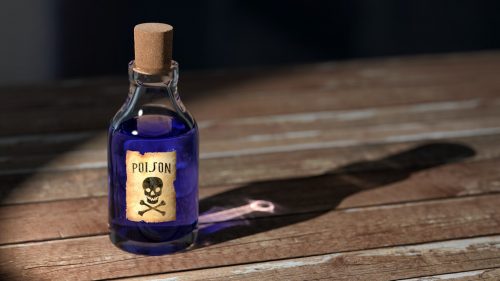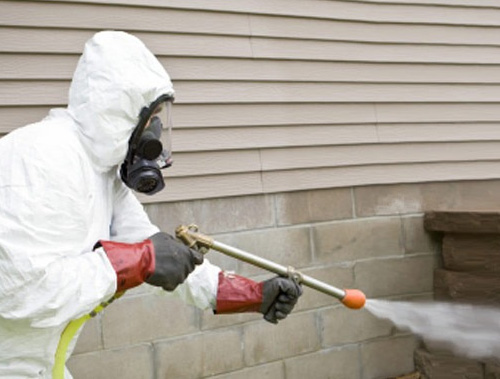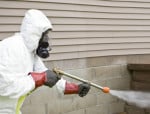Recently, a 10-year-old boy Peyton McCaughey and his family fell ill shortly after a Pest Control, sprayed their home in Florida, USA for termites. The family was told it was safe to return to their home two days later. The family immediately began feeling ill after moving back home.
According to CNN, the boy’s uncle, Ed Gribben, said that everyone was vomiting, and Peyton’s condition was even worse. Gribben said Peyton had trouble standing and speaking, so the family took him to a local clinic where a doctor suspected poisoning from fumigation.
It was later confirmed young Peyton is suffering from brain damage.

Fumigation
The chemicals used in the fumigation process can have grave consequences. Some of these Chemicals include chlorpyrifos; which can cause neurological damage, sulfuryl fluoride, phosphine; which is extremely toxic when inhaled. In addition, methyl bromide depletes the ozone layer. All these chemicals are widely used in fumigant.
From the studies that produced these findings, the negative effects are felt more from much higher concentrations than what you would be subjected to after having your house fumigated. However, we need to take into account the fact that when fumigating, several chemicals are typically used at one time; and their interactions have never been fully measured, especially when it comes to kids.
In Nigeria many so fumigation experts do not warn their clients enough about the imminent danger the fumigation chemicals have on their health. Secondly, when they do, Nigerians are fond of taking precautionary measures lightly.
[Tweet “In Nigeria, many so fumigation experts do not warn their clients enough about the imminent danger the fumigation chemicals have on their health.”]
It is important for you to take the time to learn about the dangers of fumigating your home. Below, are basic fumigation safety tips, along with detailed steps you should take in preparing for fumigation.
Fumigation Safety Tips
Ask
Ask the fumigator or his company for a written description of the chemicals that are used in their fumigation process. You can then carry out your own research on these chemicals. If the company won’t provide the list, find another company that will. You can refer to a site such as the Environmental Working Group which provides information on healthy living.
Preparing
Preparing is one of the most important factors; when it comes to guarding against potential health hazards related to exposure of fumigation chemicals and gases. Here are some precautions for those planning to fumigate their homes:
- Remove all people from the area to be fumigated
- Take away all potted or hanging plants
- Remove all pets from the house and even from the areas close enough to the fumigated area that chemical fumes could be present
- All foods, including candy and chewing gum, foods in refrigerators and freezers must be removed, or sealed with tape in Nylofume bags
- Any food, drinks and medications that might be exposed to fumigation gases should be sealed in plastic bags or removed. Even your pet food.
- Remove vehicles from garages that may be attached to a house that is to be fumigated
- Cover mattresses inside plastic covers, including baby mattresses.
- Remove, or seal in plastic bags, any food and medications that might be exposed to fumigation gases.
- All medicine not sealed in glass or metal containers must be removed
- Dry dirt 12″ or more from the house foundation should be watered.
- Turn off air conditioning units
- Open drawers, cupboards, and closet doors prior to fumigation
- Remove all jewellery, furs, swimsuits
- Remove or bag alcoholic beverages with seals broken
- Safes, Vaults, lockers, cabinets must be unlocked and opened

Re-Use of The Fumigated Area
When the fumigation period has passed, usually 15 to 30 hours, you should air out your house. This means all windows should be opened. Fans should be used to exhaust chemical fumes that remain after initial fumigation. You may want to keep the windows opened even after you have moving back into your home. I would also advise that you change and wash the bed sheets and all coverings used to protect furniture.
If possible or you are concerned, get a qualified person to measure the levels of chemical fumes that may remain inside the house.
Fumigation Chemical Exposure Symptoms
Watch for symptoms of over-exposure to fumigation gases during and after fumigation, such as nausea, headaches, coughing, breathing difficulties, double vision, dizziness, and fatigue. People who have been exposed to these gases and who experience any of these symptoms should seek immediate medical attention.
If you intend to fumigate your home soon, take all the precautions mentioned above. The additional steps will protect your family, pets, and plants from being harmed.
Have you had issues with fumigation? Do you have other precautionary measures against fumigation hazards?



